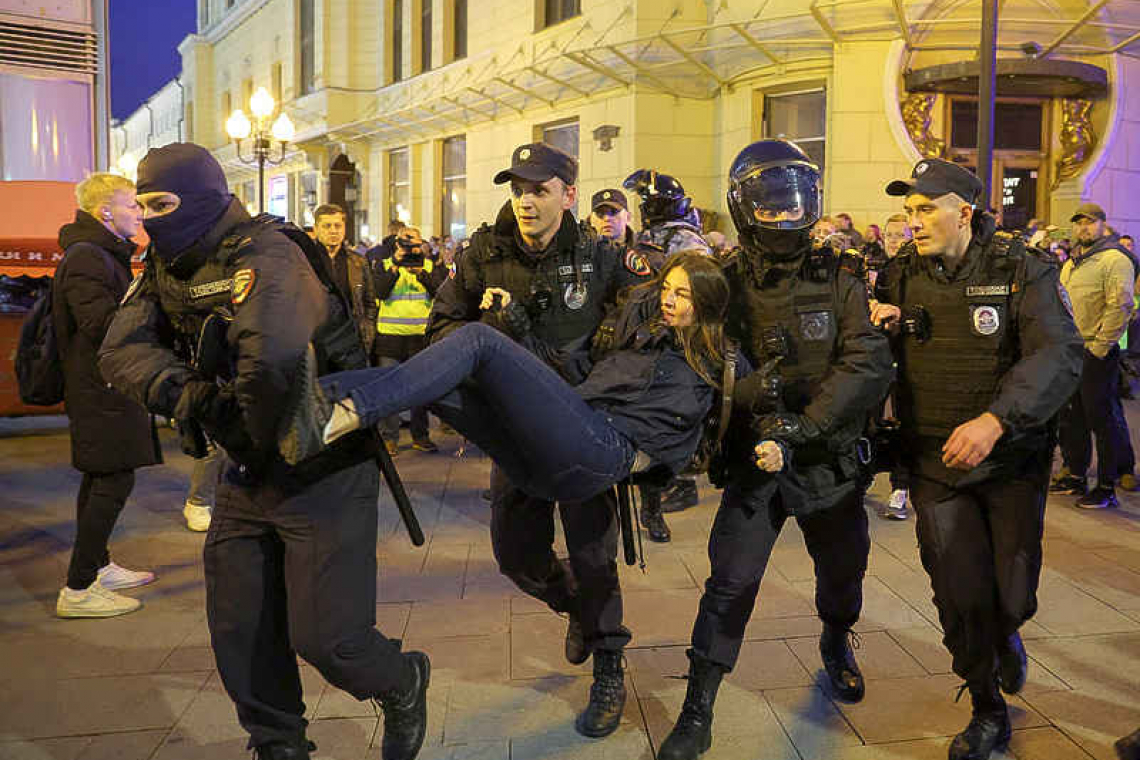Russian law enforcement officers detain a person during an unsanctioned rally, after opposition activists called for street protests against the mobilisation of reservists ordered by President Vladimir Putin, in Moscow, Russia on Wednesday.
NEW YORK/KYIV--President Volodymyr Zelenskiy demanded a special United Nations tribunal impose "just punishment" on Russia for its invasion of Ukraine, including financial penalties and stripping Moscow of its veto power in the Security Council.
Zelenskiy's recorded address to world leaders at the U.N. General Assembly on Wednesday came after Russian President Vladimir Putin ordered Russia's first wartime mobilisation since World War Two. Moscow plans to conscript some 300,000 troops in an apparent escalation of its Ukraine invasion that began in February and has left thousands dead, displaced millions and reduced towns to rubble.
"A crime has been committed against Ukraine, and we demand just punishment," Zelenskiy told the U.N. body.
"A special tribunal should be created to punish Russia for the crime of aggression against our state... Russia should pay for this war with its assets," the Ukrainian president said, urging the U.N. to "remove the right of veto" from Russia as a Security Council member.
Zelenskiy laid out what he said were five non-negotiable conditions for peace. These included punishment for Russian aggression, restoration of Ukraine's security and territorial integrity, and security guarantees. Many delegates at the U.N. gave Zelenskiy a standing ovation at the end of his speech.
Earlier on Wednesday, Putin had ordered the military draft in a televised address in which he also announced moves to annex four Ukrainian provinces and threatened to use nuclear weapons to defend Russia, declaring: "It's not a bluff".
Flights out of Russia quickly sold out, and jailed opposition leader Alexei Navalny called for mass demonstrations against the mobilisation. Russians said some people were already receiving call-up notices, and police were barring men from leaving one city in the south.
Independent protest monitoring group OVD-Info said more than 1,300 people had been detained in protests by Wednesday evening.
Offering no evidence, Putin accused officials in NATO states of threatening to use nuclear weapons against Russia. They should know that "the weathervane can turn towards them," he said, adding that Russia "also has various means of destruction".
"When the territorial integrity of our country is threatened, we will certainly use all the means at our disposal to protect Russia and our people. It's not a bluff."
U.S. President Joe Biden, in a speech to the U.N. General Assembly, responded: "Again, just today, President Putin has made overt nuclear threats against Europe, in a reckless disregard for the responsibilities of the non-proliferation regime."
Foreign ministers of the European Union and Group of Seven countries, in New York for the General Assembly, called meetings for late Wednesday to discuss new sanctions and weapon deliveries for Kyiv after Putin's order. "It's clear Russia wants to destroy Ukraine," EU foreign policy chief Josep Borrell said. "We will not be intimidated."
The moves come at a time when Russia has been facing a string of battlefield failures, with its invasion force routed in northeastern Ukraine. Ukrainian forces have captured some of the main supply routes that had served Russia's front line in the east, and say they are now poised to push deeper into territory Moscow had captured over months of heavy fighting.
"No amount of threats and propaganda can hide the fact that Ukraine is winning this war, the international community are united and Russia is becoming a global pariah," said British Defence Secretary Ben Wallace.
Russia's mobilisation may be the riskiest domestic political move of Putin's two decades in power, and followed months of Kremlin promises it would do no such thing. The war has so far appeared to enjoy popular support in a country where independent media have all been shut down and public criticism of the "special military operation" is banned. But for many ordinary Russians, especially in the urban middle classes, the prospect of being sent to fight would be the first hint of the war affecting them personally.
On the Moscow metro, men could be seen studying call-up papers. "You always feel worried at moments like these. Because you have a wife and kids and you think about it," one resident told Reuters.







